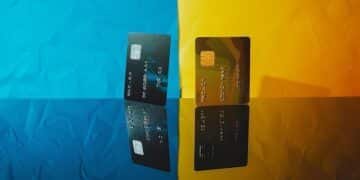Build Credit Without a Credit Card: 2025 Strategies

Building credit without a credit card in 2025 involves utilizing alternative strategies such as secured credit lines, credit-builder loans, reporting rent and utility payments, and becoming an authorized user on a responsible account, providing pathways to establish or improve creditworthiness.
Want to establish or improve your credit score but hesitant about getting a credit card? You’re in luck! This guide explores **how to build credit without a credit card: alternative strategies for 2025**, offering practical and innovative approaches to boost your creditworthiness.
Understanding Credit Scores and Why They Matter
A credit score is a numerical representation of your creditworthiness, reflecting how likely you are to repay borrowed money. Understanding credit scores is crucial because they significantly impact various aspects of your financial life.
What is a Credit Score?
Your credit score is calculated based on your credit history, including factors like payment history, amounts owed, length of credit history, credit mix, and new credit. This score helps lenders assess the risk of lending money to you.
A good credit score can unlock several financial opportunities:
- Lower Interest Rates: Access better terms on loans and credit cards.
- Easier Loan Approvals: Increase your chances of getting approved for mortgages, auto loans, and personal loans.
- Better Insurance Rates: Some insurers use credit scores to determine premiums.
- Rental Opportunities: Landlords often check credit scores as part of the application process.
Building a credit score translates to greater financial flexibility and savings over time, making it a worthwhile endeavor.
Secured Credit Lines: A Safe Starting Point
Secured credit lines provide a less risky way to build credit because they require you to provide collateral, reducing the lender’s risk. This can be an ideal first step for those without a credit history.

How Secured Credit Lines Work
With a secured credit line, you deposit cash as collateral. The credit line you receive typically matches the amount you deposit. For example, a $500 deposit may get you a $500 credit line.
Using a secured credit line responsibly involves several key practices:
- Making Timely Payments: Always pay your bills on time to positively impact your credit score.
- Keeping Utilization Low: Aim to use only a small portion of your available credit.
- Monitoring Your Credit Report: Regularly check your credit report for any errors or discrepancies.
By managing a secured credit line effectively, you demonstrate responsible credit behavior, leading to improved creditworthiness.
Credit-Builder Loans: Building Credit Incrementally
Credit-builder loans are designed specifically to help individuals establish or improve their credit scores. These loans differ from traditional loans in their structure and purpose.
The Mechanics of Credit-Builder Loans
With a credit-builder loan, you make fixed monthly payments over a set period. The loan proceeds are typically held in a savings account or certificate of deposit (CD) until the loan is fully repaid. Once the loan is repaid, you receive the funds, essentially having built credit while saving money.
The key benefits of credit-builder loans include:
- Accessibility: Easier to obtain compared to traditional loans, especially for individuals with limited credit history.
- Structured Repayment: Predictable monthly payments help build a positive payment history.
- Dual Benefit: Opportunity to save money while improving creditworthiness.
Credit-builder loans offer a structured and accessible pathway to credit improvement for those who might not qualify for other credit products.
Reporting Rent Payments: Leverage Your Housing Expenses
Rent reporting services can help you build credit by including your monthly rent payments in your credit history. This is an increasingly recognized method for showcasing your reliability.

How Rent Reporting Works
Rent reporting services work by verifying your rent payments with your landlord and then reporting this information to credit bureaus. Not all credit bureaus accept rent payment data, so it’s essential to use a service that reports to major bureaus like Experian, Equifax, or TransUnion.
Several popular rent reporting services are available, including:
- Experian RentBureau: Reports rent payments to Experian.
- RentTrack: Reports to all three major credit bureaus.
- PayYourRent: Reports to TransUnion and Equifax.
By using rent reporting, you can transform your regular housing expenses into an opportunity to build credit and improve your credit profile.
Becoming an Authorized User: Piggybacking on Good Credit
Becoming an authorized user on someone else’s credit card account can be a quick way to start building credit, particularly if the primary cardholder has a long history of responsible credit use.
The Role of Authorized Users
As an authorized user, you’re added to an existing credit card account without having ownership or direct responsibility for the debt. However, the account’s payment history is reported to your credit file, helping you build credit.
When considering becoming an authorized user, keep the following points in mind:
- Primary Cardholder’s Responsibility: Ensure the primary cardholder has a history of timely payments and low credit utilization.
- Impact on Credit Score: Positive payment history can significantly boost your credit score.
- Potential Downsides: Negative payment behavior by the primary cardholder can negatively impact your credit score.
Becoming an authorized user can be a strategic way to build credit, but it’s crucial to choose a responsible primary cardholder to ensure positive credit building.
Utility and Cell Phone Payments: An Untapped Resource
Some credit reporting agencies are beginning to incorporate utility and cell phone payments into credit reports. This offers another avenue for building credit without traditional credit cards.
Including Utility Payments in Credit Reports
Traditionally, utility and cell phone payments were not included in credit reports. However, services like Experian Boost allow you to link your bank account and include these payments in your credit history.
The advantages of including utility and cell phone payments are:
- Expanded Credit Data: Adds more payment history to your credit file.
- Potential Credit Score Boost: Positive payment behavior can improve your credit score.
- Accessibility: Available to almost everyone who pays utility and cell phone bills.
By leveraging your regular utility and cell phone payments, you can enhance your credit profile and demonstrate responsible financial behavior, leading to improved creditworthiness.
Monitoring Your Credit: Stay Informed and Proactive
Regularly monitoring your credit report is essential in the credit-building process. It helps you track your progress and identify any potential issues early on.
The Importance of Credit Monitoring
Monitoring your credit involves checking your credit reports from the major credit bureaus (Experian, Equifax, and TransUnion) regularly. You can obtain free copies of your credit reports annually from AnnualCreditReport.com.
Key reasons to monitor your credit include:
- Accuracy: Identify and correct any errors or inaccuracies on your credit report.
- Fraud Detection: Spot any signs of identity theft or unauthorized activity.
- Progress Tracking: Monitor the impact of your credit-building efforts over time.
Staying informed about your credit status empowers you to take proactive steps to improve and maintain your creditworthiness.
| Key Point | Brief Description |
|---|---|
| 🔑 Secured Credit Lines | Use cash deposit as collateral to establish credit. |
| 🏦 Credit-Builder Loans | Build credit by making fixed payments on a small loan. |
| 🏠 Report Rent Payments | Add rent payments to your credit history using reporting services. |
| 📱 Utility Payments | Include utility and cell phone payments in your credit report. |
FAQ
▼
Yes, it’s entirely possible! Alternative strategies like secured credit lines, credit-builder loans, rent reporting, and utility payment reporting offer viable ways to establish and improve your credit score without using a traditional credit card.
▼
The timeline varies depending on how consistently you use these methods. Generally, you can start seeing noticeable improvements in your credit score within 3 to 6 months with responsible and regular payment behavior.
▼
The primary risk is failing to make timely payments, which can negatively impact your credit score. Ensure you can comfortably afford the monthly payments before committing to a credit-builder loan to avoid damaging your credit.
▼
Yes, becoming an authorized user can positively or negatively affect your credit score, depending on the primary cardholder’s payment behavior. Choose someone with a responsible credit history to ensure a positive impact.
▼
Regularly check your credit reports from Experian, Equifax, and TransUnion to track your credit-building progress. Use free monitoring services or AnnualCreditReport.com to stay informed and address any potential issues promptly.
Conclusion
Building credit without a credit card in 2025 is achievable through various innovative strategies. Utilizing secured credit lines, credit-builder loans, rent and utility payment reporting, and authorized user status provides diverse pathways to establish or improve your creditworthiness, leading to greater financial opportunities.





